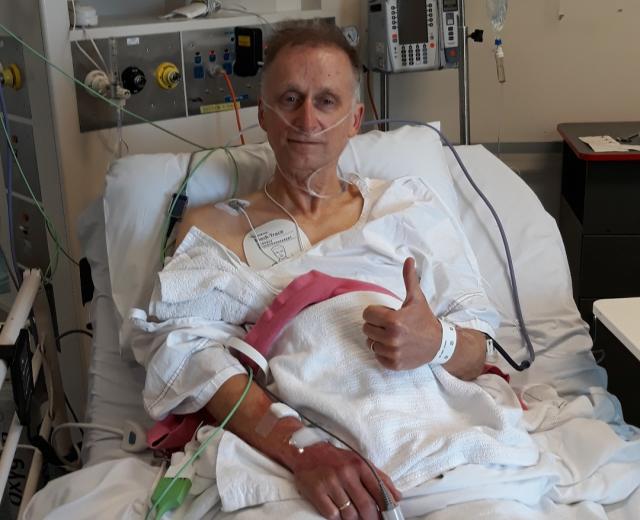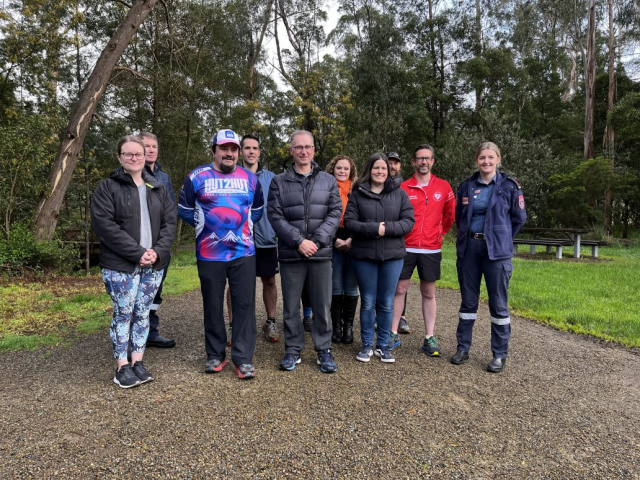
By Parker McKenzie
On May 21, 66-year-old Gerard Bakker was participating in a weekly 5km park run at Birdsland Reserve in Belgrave.
It was on this run he started to feel a familiar pain in his back.
“I’d had it checked out and they said everything was alright. I continued to get back pain when I ran, but on this day it was a bit more severe,” Mr Bakker said.
“On this day, whatever I did, something moved and blocked off an artery completely and I collapsed.”
His daughter Natalie immediately started giving Mr Bakker CPR, before other people assisted her while a nearby defibrillator was located and deployed.
“I got shocked two or three times, I believe. On the third or the second occasion, I’m not sure which, it put my heart back in a rhythm,” Mr Bakker said.
“That’s when I came to and I saw all the people standing around me, including the paramedics who arrived, I believe it’s about 15 or 20 minutes I was out.”
Four months on, Mr Bakker returned to Birdsland Reserve to meet with the bystanders, paramedics and defibrillator donator who assisted in saving his life.
Mr Bakker said he believes he survived an out-of-hospital cardiac arrest because the people around him achieved everything needed in the “chain of survival.”
“First link is an early call for help; that happened with me. The second link is early CPR and that happened to me,” he said.
“The third link is early defibrillation and that happened to me because there was a defibrillator that park run had available. The fourth link is early acute care, which is when paramedics come along to give you treatment and cart you off to the hospital.”
Another person who assisted Mr Bakker was an emergency doctor, who responded to an alert through the GoodSAM (smartphone-activated medic) app.
The defibrillator was donated by Brett Orpwood, who previously survived a cardiac arrest at a park run event five years earlier.
“It’s a pretty special feeling knowing that a donated defib helped save a life and that’s something worth celebrating,” Mr Orphwood said.
After his cardiac arrest, Mr Bakker was taken to Monash Hospital where a stent was inserted into the blocked artery by the afternoon.
“My wife and I go hiking sometimes and we’re often in remote places, if it had happened there, I wouldn’t be talking to you,” he said.
Ambulance Victoria paramedic Claire Stewart said Mr Bakker’s survival was a perfect example of how early intervention by bystanders followed by CPR and the use of a defibrillator is critical in the minutes after someone goes into cardiac arrest.
“The bystanders really did all the hard work; it was amazing that he was alert when we reached him,” she said.
“They really were the heroes on this one and without them, it definitely would have been a different event.”
The survival rate within Australia for out-of-hospital cardiac arrest is around 12.5 per cent, with 18 Victorians going into cardiac arrest each day. Performing CPR and using a defibrillator increases the chances of survival by 68 per cent.
Four months on, Mr Bakker is returning to Birdsland Reserve to meet with the bystanders, paramedics and defibrillator donator who assisted in saving his life during the “surreal” experience.
“I’m just very thankful for those people who got involved and there are people who got involved that I haven’t met yet,” he said.
Throughout October, Ambulance Victoria will launch a month-long Shocktober campaign with the aim to improve cardiac arrest survival rates through raising awareness about the critical first minutes and encouraging Victorians to learn CPR, become a GoodSAM responder and know where local defibrillators are.







